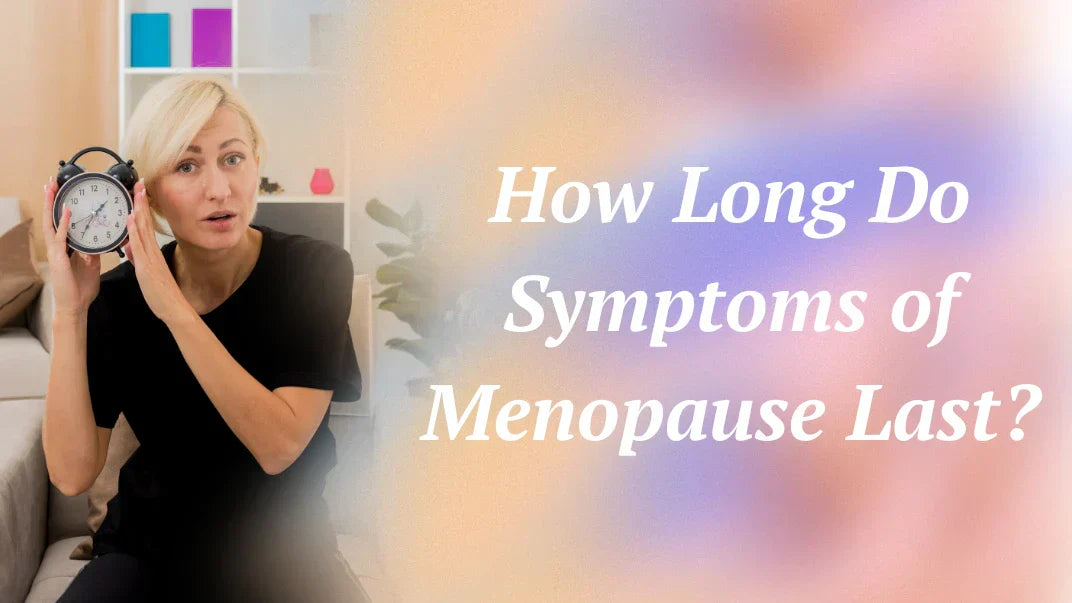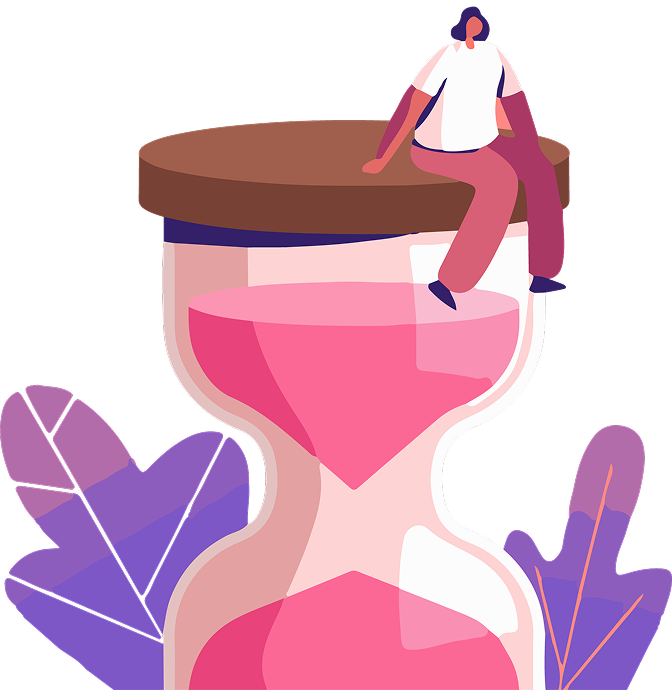
How Long Do Menopause Symptoms Last?
Share
Menopause symptoms can vary significantly from person to person, but on average, they last between 4 to 10 years. This timeline encompasses the stages of perimenopause, menopause, and postmenopause. For some women, certain symptoms, such as Hot Flushes or vaginal dryness, may persist longer than others.
Hot Flushes and Night Sweats
These iconic symptoms affect up to 75% of women and can persist for an average of 7–10 years. For some, they extend beyond a decade, even into their 70s.
Mood Changes
Irritability, anxiety, and depression are common during perimenopause but often subside within a few years post-menopause.
Sleep Disturbances
Insomnia, fueled by night sweats and hormonal shifts, may last several years but tends to improve with lifestyle adjustments or medical treatments.
Vaginal Dryness
Unlike other symptoms, this can persist indefinitely without intervention, as estrogen levels remain low after menopause.

This infographic has been created based on the study published in verywellhealth, resources.healthgrades, clevelandclinic
The Stages of Menopause
Menopause is not a singular event but a progression through three distinct stages:
1. Perimenopause: The Prelude to Change
Perimenopause begins years before menopause, typically in a woman’s 40s, though it can start as early as age 35. Hormonal fluctuations during this period can lead to irregular periods, hot flushes, and mood swings. On average, perimenopause lasts between 4 to 8 years, but this can vary widely.
Signs of menopause at 40: Irregular periods, sleep disturbances, and increased PMS-like symptoms may indicate the onset of perimenopause in your 40s.
2. Menopause: The Turning Point
Menopause is defined as 12 consecutive months without a menstrual cycle and usually occurs around age 51 for most women. This stage signifies the end of fertility and is often when symptoms like hot flushes, night sweats, and sleep disturbances are most intense.
What are the first signs of menopause? Common early signs include irregular periods, hot flushes, and mood changes.
3. Postmenopause: The New Normal
Postmenopause begins after menopause and continues for the rest of a woman’s life. While many symptoms gradually diminish, some—such as vaginal dryness and bone density issues—may persist without proper intervention.
Post-menopause symptoms at age 60: Vaginal dryness, urinary incontinence, and increased risk of osteoporosis are common at this stage.
Does Menopause Last the Same for Everyone?
No, each woman goes through menopause . Things like genes how you live, and your health make a big difference in how long it lasts and how bad the symptoms get.
Some women might have mild symptoms for a short time, while others deal with tough symptoms for many years.
What Matters: Smoking how stressed you are, what you eat, and your health history (like having your uterus or ovaries removed) can change how long it lasts.
How to Manage Menopause Symptoms That Last Years
If your menopause symptoms don't let up, you can try a mix of changing your habits getting medical help, and using natural treatments:
Lifestyle Changes:
- Work out often to lift your mood and keep your bones strong.
- Eat foods full of calcium, vitamin D, and omega-3 fats to boost your health.
Medical Options:
- Hormone Replacement Therapy (HRT) can ease symptoms like Hot Flushes and dry vagina.
- Drugs without hormones, like gabapentin, might help with Hot Flushes or trouble sleeping.
Natural Solutions:
- Herbs such as black cohosh or red clover, can help with mild symptoms (ask your doctor first).
- Being mindful and trying acupuncture show promise to handle emotional and physical discomfort.
Menopause Symptoms Duration by Age: 40s, 50s, and Beyond
-
In Your 40s (Perimenopause):
Your hormones start to change causing your periods to become irregular. You might feel mild Hot Flushes and mood changes. This phase lasts 4-8 years. -
In Your 50s (Menopause):
Most women reach menopause around 51 years old. Doctors confirm menopause when you haven't had a period for 12 months straight. Hot Flushes and night sweats often hit their worst during this time. -
In Your 60s and Beyond (Postmenopause):
Some issues like dry vagina or weaker bones can stick around if you don't make lifestyle changes or get medical help.
Are Menopause Symptoms Permanent?
For most women, menopause symptoms don't last forever and get better over time. But some problems, like vaginal dryness less interest in sex, or bone health concerns, might need ongoing care.
- Hot Flushes: go away within 7-10 years.
- Mood Swings: calm down after hormone levels become steady.
- Vaginal Dryness: May continue without end if left untreated (e.g. using vaginal estrogen or lubricants).
Do Hot Flushes Go Away After Menopause?
Hot Flushes decrease after menopause for most women, but 10-20% might have them into their 70s or beyond. Using HRT or lifestyle methods like cooling techniques staying away from triggers, and keeping stress in check can help ease symptoms.
How Long Does Postmenopausal Insomnia Last?
Postmenopausal insomnia can continue for several years because of low estrogen levels and symptoms such as night sweats. To improve sleep quality over time, you can practice good sleep habits, exercise, and look into non-hormonal treatments (like melatonin or mindfulness).
How Long Do Mood Swings Last in Menopause?
Mood swings hit harder during perimenopause and calm down within a few years after menopause. They often link to hormone changes and outside stressors. To get relief faster:
- Try yoga or meditation to handle stress better.
- Think about short-term medical options, like low-dose antidepressants.
Can Menopause Symptoms Come Back After Stopping HRT?
When you stop Hormone Replacement Therapy (HRT), some symptoms might come back such as Hot Flushes, night sweats, or mood changes. These renewed symptoms can last from a few months to a year. To lessen their strength, doctors often suggest reducing HRT under their watch.
How Long Do Menopause Symptoms Last after a Hysterectomy?
The duration of menopause symptoms following a hysterectomy varies based on whether the ovaries are removed:
- With Ovary Removal (Surgical Menopause): Symptoms such as Hot Flushes and mood swings can emerge suddenly and may persist for 5–10 years due to the rapid decline in hormones.
- Without Ovary Removal: If the ovaries remain, symptoms may align with the natural progression of menopause, generally lasting around 4–8 years.
How Long Do Menopause Symptoms Last after Your Period Stops?
Menopause is officially diagnosed after you have not had a period for 12 consecutive months. Symptoms often peak during perimenopause and can continue for several years after your last period. For many women, symptoms gradually decrease after menopause, but some, like vaginal dryness, may continue indefinitely without treatment.
How Long Do Menopause Symptoms Last after Stopping HRT?
Discontinuing HRT can lead to the return of symptoms, especially if you stop abruptly instead of tapering off gradually. These "rebound symptoms" can last from a few months to a year. A gradual and controlled reduction in HRT can help lessen their severity and duration.
How Long Do Menopause Symptoms Last after Ovary Removal (Oophorectomy)?
If you've undergone an oophorectomy, which is the surgical removal of your ovaries, you might experience sudden menopause, often referred to as surgical menopause. The symptoms can be more intense and may persist for 5 to 10 years if not properly managed. Hormone therapy is frequently effective in alleviating both the severity and duration of these symptoms.
How Long Do Menopause Symptoms Last after Surgical Menopause?
Surgical menopause, resulting from procedures such as a hysterectomy or oophorectomy, typically triggers a rapid onset of symptoms. Lacking the gradual transition seen in natural menopause, symptoms like Hot Flushes and sleep issues can be more pronounced and may last anywhere from 5 to 10 years.
The end of menopause symptoms is often marked by a decrease in the frequency and severity of hot flushes, a stabilization of moods, and improved sleep patterns. These changes signify the body’s gradual adjustment to its new hormonal baseline.
The most intense symptoms typically occur during menopause itself. This stage, defined by 12 consecutive months without a menstrual cycle, is often accompanied by the height of hot flushes, night sweats, and significant emotional fluctuations. These challenges make this period particularly demanding for many women.
For most, menopause symptoms persist for about 4 to 8 years, though the timeline varies widely. Certain symptoms, such as hot flushes, may continue even longer for some individuals. On average, menopause symptoms last around 7 years, but this duration is influenced by factors such as genetics, lifestyle, and overall health. Each woman’s experience is unique, underscoring the importance of personalized care and attention during this transformative phase.
Thriving Through Menopause
While menopause symptoms can be tough, they also offer a chance to focus on self-care and embrace healthy habits. Here’s how:
Lifestyle Changes
- Exercise: Engaging in regular physical activity helps reduce stress, boosts mood, and supports bone health.
- Nutrition: A well-balanced diet that includes calcium, vitamin D, and omega-3 fatty acids is crucial.
- Sleep Hygiene: Sticking to a consistent bedtime routine can help alleviate insomnia.
Medical Interventions
- Hormone Replacement Therapy (HRT): This can be effective for managing hot flushes and maintaining bone health, though it may not be suitable for everyone.
- Non-Hormonal Options: Medications such as antidepressants or gabapentin can help relieve certain symptoms.
Alternative Therapies
- Acupuncture: Some women find relief from hot flushes and mood swings through acupuncture.
- Herbal Remedies: Black cohosh and red clover may provide benefits but should be taken under medical supervision.
When to Seek Help
Although menopause is a natural process, some symptoms may need medical attention:
- Ongoing vaginal bleeding after menopause.
- Symptoms that significantly disrupt daily life.
- Sudden or unexplained changes in health.
Embracing a New Chapter
Menopause signifies the start of a new stage in life. With the right resources and support, it’s possible to navigate this transition with poise and confidence. Remember, you’re not alone—many women are on this journey, and help is always within reach.
No matter if you're noticing symptoms at 47, 50, or 60, being in tune with your body and pursuing the right care can truly make a significant impact.





